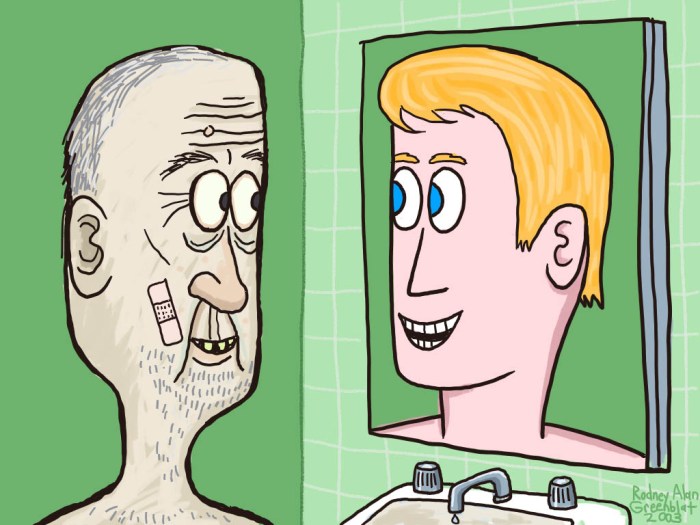Mirror image perceptions ap psych, a fascinating phenomenon in psychology, has captivated researchers for decades. This introduction delves into the intricacies of mirror neurons, the neural basis of mirror image perceptions, and their diverse applications across various fields.
Mirror image perceptions, the ability to recognize and interpret mirror images, play a crucial role in our social interactions, motor skills, and cognitive processes. This introduction provides a comprehensive overview of the topic, setting the stage for an in-depth exploration of its mechanisms and implications.
Mirror Image Perceptions: Mirror Image Perceptions Ap Psych

Mirror image perceptions refer to the ability to recognize and interpret the mirror image of an object or a body part as if it were the original. This phenomenon involves the activation of specific brain areas, particularly mirror neurons, which are responsible for understanding and executing actions by observing others.
Mirror neurons play a crucial role in mirror image perceptions by providing a neural representation of the observed action. When an individual observes an action, these neurons fire in a similar pattern as if the individual were performing the action themselves.
This neural mirroring allows for the recognition and interpretation of mirror images.
Types of Mirror Image Perceptions
Mirror image perceptions can be categorized into two main types:
- Congruent Mirror Image Perceptions:These perceptions occur when the mirror image of an object or body part is recognized as being identical to the original. For example, when an individual looks at their reflection in a mirror, they recognize it as their own image.
- Incongruent Mirror Image Perceptions:These perceptions occur when the mirror image of an object or body part is recognized as being different from the original. For example, when an individual looks at their reflection in a mirror with their left and right sides reversed, they may initially perceive it as unfamiliar.
Factors Influencing Mirror Image Perceptions
Several factors can influence mirror image perceptions, including:
- Age:Mirror image perceptions develop gradually during infancy and early childhood. Infants initially show difficulty recognizing mirror images, but this ability improves with age.
- Culture:Cultural factors can influence the way individuals perceive mirror images. For example, in some cultures, mirror images are considered to be sacred or have spiritual significance, which can affect how they are interpreted.
- Experience:Prior experience with mirror images can also impact perception. Individuals who have had more exposure to mirrors and mirror images tend to have better mirror image recognition abilities.
Applications of Mirror Image Perceptions, Mirror image perceptions ap psych
Mirror image perceptions have various applications in different fields:
- Psychology:Mirror image perceptions are used to study self-recognition, body image, and social cognition.
- Neuroscience:Research on mirror image perceptions provides insights into the neural mechanisms underlying action understanding and imitation.
- Sports:Mirror image perceptions play a role in sports performance, as athletes often need to visualize and execute mirror image movements, such as in tennis or dance.
Limitations and Future Directions
While research on mirror image perceptions has provided valuable insights, there are still some limitations:
- Limited understanding of neural mechanisms:Despite the role of mirror neurons in mirror image perceptions, the exact neural mechanisms underlying these perceptions are not fully understood.
- Individual variability:There is considerable individual variability in mirror image perception abilities, and the factors contributing to these differences are not fully explored.
Future research directions include investigating the neural basis of mirror image perceptions, exploring the role of mirror image perceptions in social interactions, and developing interventions to improve mirror image perception abilities.
Key Questions Answered
What are mirror image perceptions?
Mirror image perceptions refer to the ability to recognize and interpret mirror images, which involves the activation of specific brain regions known as mirror neurons.
What is the role of mirror neurons in mirror image perceptions?
Mirror neurons are specialized brain cells that respond both when an individual performs an action and when they observe someone else performing the same action. These neurons play a crucial role in understanding and imitating others’ actions, as well as in recognizing and interpreting mirror images.
